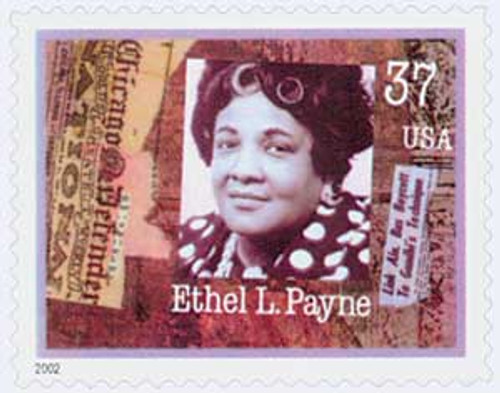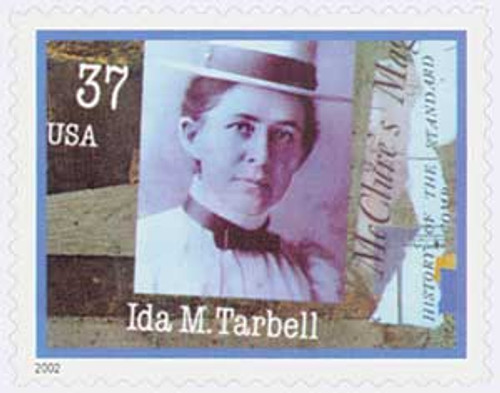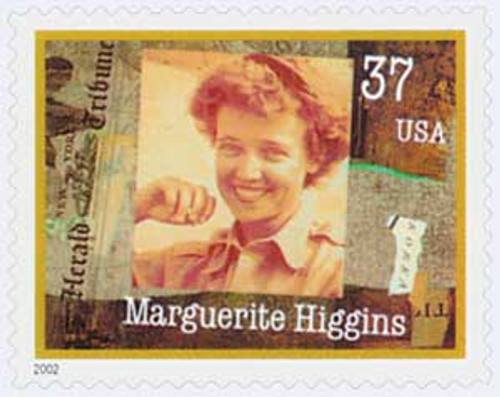
# 3667 - 2002 37c Women in Journalism: Ethel L. Payne
37¢ Ethel Payne
Women in Journalism
Color: Multicolored
Birth of Ethel L. Payne
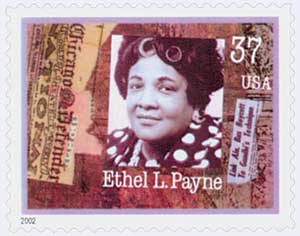
Ethel Lois Payne was born on August 14, 1911, in Chicago, Illinois. Known as the “First Lady of the Black Press,” she was the first black female war correspondent in Vietnam and the first black female commentator on a major radio and television network.
Payne was the daughter of a Pullman porter (railroad workers who assisted passengers), and the granddaughter of a former slave. She attended the City Colleges of Chicago and the Medill School of Journalism at Northwestern University before working as a library assistant at the Chicago Public Library.
Payne left her library job in 1948 to go to Tokyo to work as a club hostess at the Army Special Services club, similar to the Red Cross. While working there, Payne kept a journal on the segregation of black soldiers in Japan. She shared her journal with a reporter from the Chicago Defender, a black weekly newspaper. The reporter was impressed with her writing and sent her entries to his paper. The published articles embarrassed the military, but won Payne a job. She returned to Chicago, studied journalism, and began a 27-year career with the Defender.
Payne became the Chicago Defender’s one-person Washington bureau. Payne covered both national and world news, making her the first African-American woman to cover international news. At the time, she was one of only three accredited African Americans on the White House Press Corps.
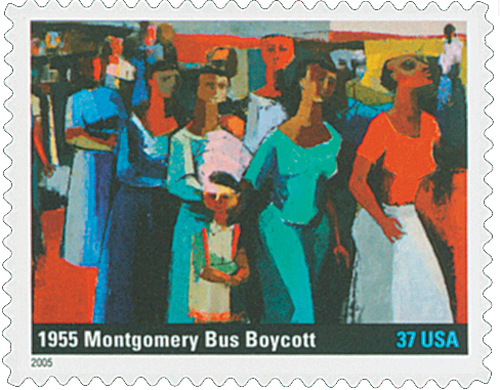
During her long career with the Defender, Payne covered several important events in the Civil Rights Movement, including the Montgomery bus boycott (1955-56), desegregation at the University of Alabama (1956), and the March on Washington (1963). She also attended the Bandung Conference, the first large-scale meeting of Asian and African states.
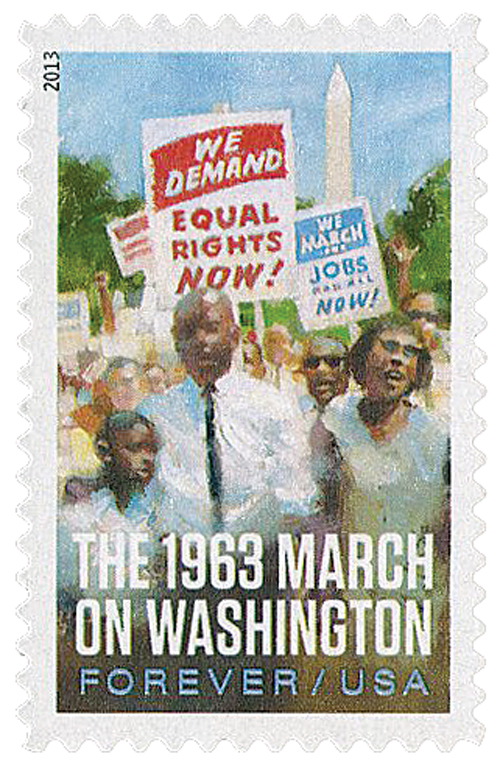
Payne never hesitated to ask difficult questions, even at presidential press conferences. In 1954, she asked President Eisenhower when he planned to desegregate interstate travel. Eisenhower responded with irritation saying that his administration “is not in the effort to support any particular or special group of any kind.” When both the black and white presses reported on his response as showing he believed equal rights were nothing more than “special interests,” he was further angered and refused to call on her again for the rest of his presidency. Ike’s press secretary, James Hagerty, tried to remove her credentials, and went so far as to have her tax returns investigated. Payne, however, continued to cover the White House through seven presidents. A decade later, she attended the signing of the Civil Rights Act of 1964 and President Johnson gave her one of the pens he used to sign the act.
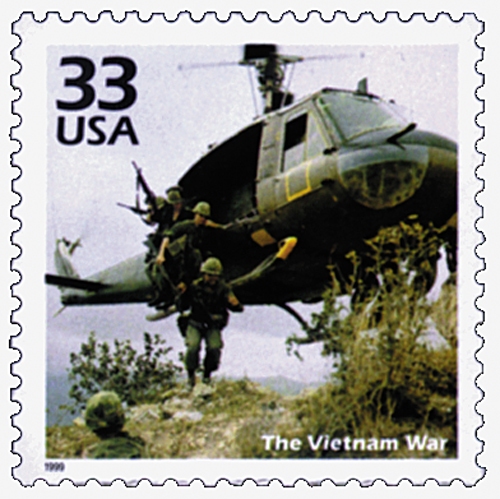
Payne went to Vietnam in 1966, becoming the first black female war correspondent in Vietnam. She then covered the Nigerian Civil War and the International Women’s Year Conference in Mexico City. In 1972, Payne became the first black woman commentator on a major radio and television network when she was hired by CBS. In 1978, she joined the Women’s Institute for Freedom of the Press and she later taught journalism at Fisk University in Nashville, Tennessee. In the 1980s, she covered apartheid in South Africa and pushed for the release of Nelson Mandela.
Payne died on May 29, 1991. She received many awards during her lifetime and the National Association of Black Journalists named a fellowship after her.
37¢ Ethel Payne
Women in Journalism
Color: Multicolored
Birth of Ethel L. Payne

Ethel Lois Payne was born on August 14, 1911, in Chicago, Illinois. Known as the “First Lady of the Black Press,” she was the first black female war correspondent in Vietnam and the first black female commentator on a major radio and television network.
Payne was the daughter of a Pullman porter (railroad workers who assisted passengers), and the granddaughter of a former slave. She attended the City Colleges of Chicago and the Medill School of Journalism at Northwestern University before working as a library assistant at the Chicago Public Library.
Payne left her library job in 1948 to go to Tokyo to work as a club hostess at the Army Special Services club, similar to the Red Cross. While working there, Payne kept a journal on the segregation of black soldiers in Japan. She shared her journal with a reporter from the Chicago Defender, a black weekly newspaper. The reporter was impressed with her writing and sent her entries to his paper. The published articles embarrassed the military, but won Payne a job. She returned to Chicago, studied journalism, and began a 27-year career with the Defender.
Payne became the Chicago Defender’s one-person Washington bureau. Payne covered both national and world news, making her the first African-American woman to cover international news. At the time, she was one of only three accredited African Americans on the White House Press Corps.

During her long career with the Defender, Payne covered several important events in the Civil Rights Movement, including the Montgomery bus boycott (1955-56), desegregation at the University of Alabama (1956), and the March on Washington (1963). She also attended the Bandung Conference, the first large-scale meeting of Asian and African states.

Payne never hesitated to ask difficult questions, even at presidential press conferences. In 1954, she asked President Eisenhower when he planned to desegregate interstate travel. Eisenhower responded with irritation saying that his administration “is not in the effort to support any particular or special group of any kind.” When both the black and white presses reported on his response as showing he believed equal rights were nothing more than “special interests,” he was further angered and refused to call on her again for the rest of his presidency. Ike’s press secretary, James Hagerty, tried to remove her credentials, and went so far as to have her tax returns investigated. Payne, however, continued to cover the White House through seven presidents. A decade later, she attended the signing of the Civil Rights Act of 1964 and President Johnson gave her one of the pens he used to sign the act.

Payne went to Vietnam in 1966, becoming the first black female war correspondent in Vietnam. She then covered the Nigerian Civil War and the International Women’s Year Conference in Mexico City. In 1972, Payne became the first black woman commentator on a major radio and television network when she was hired by CBS. In 1978, she joined the Women’s Institute for Freedom of the Press and she later taught journalism at Fisk University in Nashville, Tennessee. In the 1980s, she covered apartheid in South Africa and pushed for the release of Nelson Mandela.
Payne died on May 29, 1991. She received many awards during her lifetime and the National Association of Black Journalists named a fellowship after her.

